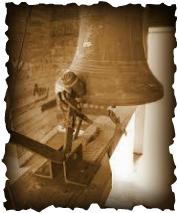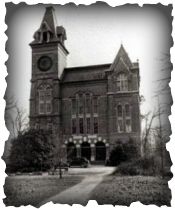Dr. Alexander Means
1801 - 1883
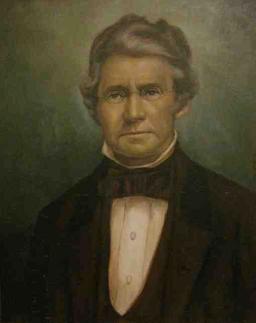
Alexander Means was a man of immense diversity. Physician, school teacher, scientist, college professor, poet, college president, statesman, and the first state chemist in the United States, Means was born on February 6, 1801 in Statesville, North Carolina, the only child of Alexander Means, Sr., an immigrant from Tyrone County, Ireland, and Sarah McClellan Means, a Scots-Irish young woman from Pennsylvania. His mother took charge of his early education and, at the age of ten or eleven, Alexander began studying chemistry and attending the “old field schools.” His education was furthered at private “academies,” which were basically tutelages under learned men. One such teacher was Milton Ladd of Wikesboro, North Carolina, with whom Alexander remained for three years. After three years under Ladd's tutelage, Alexander went to the highly successful academy of John Mushat in Statesville, where he stayed until his father’s financial resources ran out. Several of Alexander’s mentors, impressed with his intellect and promise, offered to pay for his continued education at the University of South Carolina, but his mother pride wouldn't allow them to accept the offer. Instead, at the age of 17, Means began teaching in Mocksville, North Carolina, but he soon left his position due to ill health. He tried his hand at being a merchant, but felt he was unsuited for the job. After his mother died, Means moved to what was then considered the very rural “frontier” of Georgia. He returned to teaching and was able to save enough money to pursue the study of medicine under the guidance of doctors Randolf and a Walker of Madison. He later spent one term in the medical department of Transylvania University in Lexington, Kentucky.
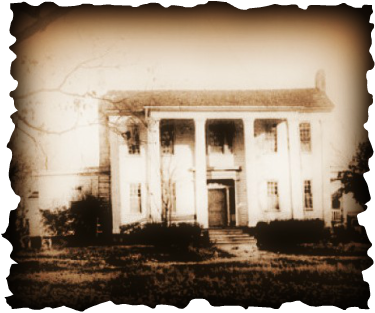 Orna Villa
Orna Villa
Sometime in 1820, Dr. Means moved to what would later become the city of Oxford and purchased a small farm house on what is now Emory Street. He set about constructing Orna Villa (meaning “Bird House”) incorporating the foundation of the original house on the site into a grand Greek Revival home designed by architect Richard K. Dearing. In 1825, Means entered into a partnership practice with Dr. Henry Gaither in the bustling town of Covington. They remained partners for six years.
Means joined the Methodist church in 1825 and became a licensed minister in 1828. On Christmas Day, 1827, Means married Miss Sarah A. E. Winston (1810 - 1888). They would have eleven children, eight of whom survived past childhood:
Means joined the Methodist church in 1825 and became a licensed minister in 1828. On Christmas Day, 1827, Means married Miss Sarah A. E. Winston (1810 - 1888). They would have eleven children, eight of whom survived past childhood:
- Thomas Alexander Means (1829 - ?)
- Leonidas Summerfield Means (1830 - 1896)
- Olin Sanford Means (1833 - ?)
- Mary Elizabeth Means (who would marry Dr. Paine Capers of Atlanta)
- Victoria Ann Means (who would marry G. W. Johnson, law partner to G. B. Haygood, father of Atticus Haygood [1839 - 1896] who was president of Emory College from 1875 to 1884)
- Susan Cade Means (1848 - ?)
- George Winston Means (1840 - 1849)
- Francis ("Frank") McClelland Means (1845 - 1919)
- Henry Gaither Means (1847 - 1848)
- Hendree Winston Means (1849 - 1897)
- Sarah Leonore Means (1851 - 1876)
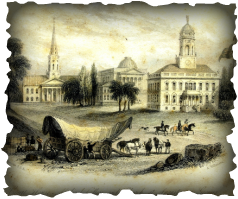 Transylvania University in Lexington, Kentucky
Transylvania University in Lexington, Kentucky
Means remained deeply involved in education and in 1833 he helped found the Newton County Female Seminary. The following year he became president of the newly formed Georgia Conference Manual Labor School. In 1838, he resigned this position to accept a professorship of natural sciences at the newly founded Emory College. He spent the winter of 1838-39 in a special study program at Jefferson Medical School in Philadelphia. It was about this time that his writings and lectures began to attract considerable attention and, in 1840, he was awarded the honorary degree of Doctor of Medicine and a professorship of chemistry at the Medical College of Georgia in Augusta. Dr. Means conducted his classes in Augusta during the winter term while continuing as chair of the natural science department at Emory. This arrangement lasted until December 1855, when Means resigned his post at Emory.
Dr. Means became fascinated with what was being discovered on the new frontier of electricity. In 1851, he traveled to England where he became acquainted with the leading scientists and inventors in the field, Sir Michael Faraday and Sir Charles Lyell. Inspired by their work, he began to conduct his own experiments in electricity, what Means liked to call “the vice-regent of God on earth.” He traveled throughout Europe and returned home "richly laden with treasures garnered in the laboratories and ancient colleges of science in London, Paris, and Berlin."
Means was a very popular professor at the Medical College of Georgia in Augusta and was well known among his students and colleagues for his brilliant lectures and fascinating experiments, especially with electricity. In 1853, while holding simultaneous professorships at the Medical College of Georgia in Augusta and Emory College in Oxford, Means took on the presidency of the Southern Masonic Female College in Covington, a position he held for about a year until the Emory trustees elected him president of their institution upon the resignation of George Foster Pierce. He had been Emory's president for only a few months when the trustees granted him permission to accept a professorship in chemistry and pharmacy at at the newly founded Atlanta Medical College, "with the distinct understanding that he is to be absent from his work at Oxford only from Friday noon till the opening of College Exercises on Monday morning each week." The demanding schedule proved untenable, however, and Means resigned the Emory presidency in December 1855, but retained professorships in both Atlanta and Augusta while making his permanent home in Oxford, lecturing in in Augusta during the winter term and in Atlanta during the summer. In the announcement of his professorship in Atlanta it was written that "it is a generally admitted fact that for profound and thorough knowledge of the subjects embraced in his chair, and for eloquence as a lecturer, he has no superior in the United States."
Dr. Means became fascinated with what was being discovered on the new frontier of electricity. In 1851, he traveled to England where he became acquainted with the leading scientists and inventors in the field, Sir Michael Faraday and Sir Charles Lyell. Inspired by their work, he began to conduct his own experiments in electricity, what Means liked to call “the vice-regent of God on earth.” He traveled throughout Europe and returned home "richly laden with treasures garnered in the laboratories and ancient colleges of science in London, Paris, and Berlin."
Means was a very popular professor at the Medical College of Georgia in Augusta and was well known among his students and colleagues for his brilliant lectures and fascinating experiments, especially with electricity. In 1853, while holding simultaneous professorships at the Medical College of Georgia in Augusta and Emory College in Oxford, Means took on the presidency of the Southern Masonic Female College in Covington, a position he held for about a year until the Emory trustees elected him president of their institution upon the resignation of George Foster Pierce. He had been Emory's president for only a few months when the trustees granted him permission to accept a professorship in chemistry and pharmacy at at the newly founded Atlanta Medical College, "with the distinct understanding that he is to be absent from his work at Oxford only from Friday noon till the opening of College Exercises on Monday morning each week." The demanding schedule proved untenable, however, and Means resigned the Emory presidency in December 1855, but retained professorships in both Atlanta and Augusta while making his permanent home in Oxford, lecturing in in Augusta during the winter term and in Atlanta during the summer. In the announcement of his professorship in Atlanta it was written that "it is a generally admitted fact that for profound and thorough knowledge of the subjects embraced in his chair, and for eloquence as a lecturer, he has no superior in the United States."
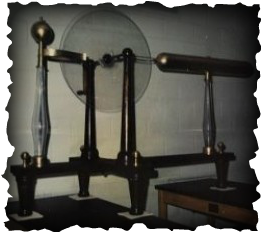 Dr. Means's Incandescent Light
Dr. Means's Incandescent Light
On June 2, 1857, after presenting a lecture to a gathering of Atlanta’s leading citizens at Atlanta’s Old City Hall, Dr. Means invited them to attend an exhibition the following evening where he was going to demonstrate a device he constructed, a primitive version of the incandescent light bulb. It produced frictional electricity, causing current to pass through wires that were attached to a chunk of black carbon, which caused the material to burst into light. One eyewitness stated that “Never … have I seen a more brilliant light. Nothing in all the phenomena of our wonderful age has ever impressed me more than this exhibition and I can never forget it as long as my memory lasts.” Although the concept of electric light was not original with Dr. Means, (that distinction belongs to England’s Sir Michael Faraday who had already invented both the incandescent and fluorescent light bulbs), it is likely that this was the first electric light bulb to be seen in the United States.
|
During his trip to England in 1851, Dr. Means acquired a bell as a gift for Emory College. Cast in 1796, it currently hangs in the bell tower of Seney Hall and is the oldest historical artifact at Oxford College.
After 19 consecutive sessions in Augusta, Means resigned his position in 1858 and focused his energies on his post in Atlanta. However, in 1860 Means rejoined the faculty at Emory College as professor emeritus of natural sciences.
|
In the winter of 1859-60, Means delivered a series of 26 lectures on the "nebular theory of planetary formation and the harmony of this theory with the Mosaic Cosmogony."
We certainly do not offend against truth, and we think not against good taste when we say that we never have witnessed such an array of scientific facts -- conceded facts -- most of them brought to bear upon a single line of discussion. During its progress, almost every science was held under contribution by way of illustrating and strengthening the lecturer's main positions. ... If his glowing imagery and stirring pathos be wonderful, his inductive power is no less so ..."
James R. Thomas
President of Emory College
(1855 - 1867)
During the run-up to the Civil War, Dr. Means was elected to the State Convention for Secession on January 2, 1861 where he presented a 45-minute speech against secession.
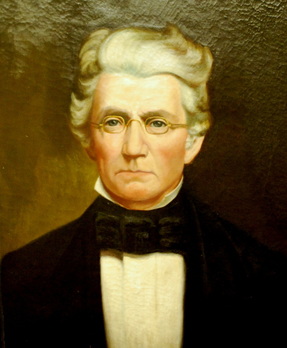
When a test vote was taken, Means, along with 129 others, voted against secession, while 165 delegates voted for it. A second test vote yielded nearly the same result. When the official vote was taken, Dr. Means recorded in his diary that he and several others voted for secession in order to “present as solid a front as possible to our enemies by swelling the majority vote.” From then on, Means supported the Confederacy with enthusiasm, calling Virginia’s decision to secede “glorious news.”
After the war, Dr. Means resumed his professorship at Atlanta Medical College until 1868, when he resigned in order to accept the position of State Chemist of Georgia, the first position of its type in the United States. He worked out of a laboratory in Savannah during the summer months and a laboratory at Orna Villa during the summer.
Among the honors bestowed upon him were the honorary degrees of DD and LLD by Emory College in 1854 and 1858 respectively. Also in 1858, he became a Fellow of the American Association for the Advancement of Science and a member of the American Chemical Society of New York City. In 1879, he was elected into membership in the Meteorological Society of Boston.
Alexander Means died on June 5, 1883 at the age of 82 and is buried at the family plot in the Oxford Historical Cemetery.
After the war, Dr. Means resumed his professorship at Atlanta Medical College until 1868, when he resigned in order to accept the position of State Chemist of Georgia, the first position of its type in the United States. He worked out of a laboratory in Savannah during the summer months and a laboratory at Orna Villa during the summer.
Among the honors bestowed upon him were the honorary degrees of DD and LLD by Emory College in 1854 and 1858 respectively. Also in 1858, he became a Fellow of the American Association for the Advancement of Science and a member of the American Chemical Society of New York City. In 1879, he was elected into membership in the Meteorological Society of Boston.
Alexander Means died on June 5, 1883 at the age of 82 and is buried at the family plot in the Oxford Historical Cemetery.
The enthusiastic, warm-hearted, gentle, tender Dr. Means, who loved an adjective as he loved an experiment, and whose splendor of diction was equaled only by his fervor of declamation and his unquestioned piety."
George G. Smith
Biographer of Bishop Pierce
